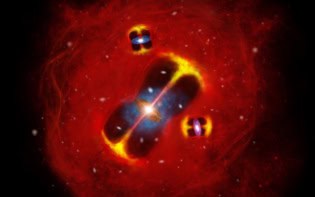Evidence that the expansion of the universe is speeding up, rather than slowing down as predicted by most theories, has been named "Breakthrough of the Year" by Science magazine. Two other breakthroughs in physics make the top ten: the discovery of neutrino mass and advances in quantum teleportation.
Astronomers have known for decades that the universe is expanding, based on measurements of the “red shift” of light emitted by galaxies. According to the standard cosmological model, there are three possible types of universe: a “closed universe” in which there is enough mass to eventually stop the expansion and cause the universe to collapse in on itself; a “flat universe” in which there is enough mass to slow the expansion, but not enough to cause it to collapse; and an “open universe” which contains so little mass that it will expand for ever.
Results from two international teams of astronomers – the High-Z SN Search and the Supernova Cosmology Project – suggest that we live in an open universe. However, when the teams looked at really distant supernovae, they found that the universe was expanding more slowly in the distant past than it has been in more recent times. One way to explain the results is to include a term called the “cosmological constant” in the general theory of relativity. Einstein once called the cosmological constant his “biggest blunder” but time may prove that he was right in the first place.
PhysicsWeb will be publish its own top ten highlights of 1998 next week.



